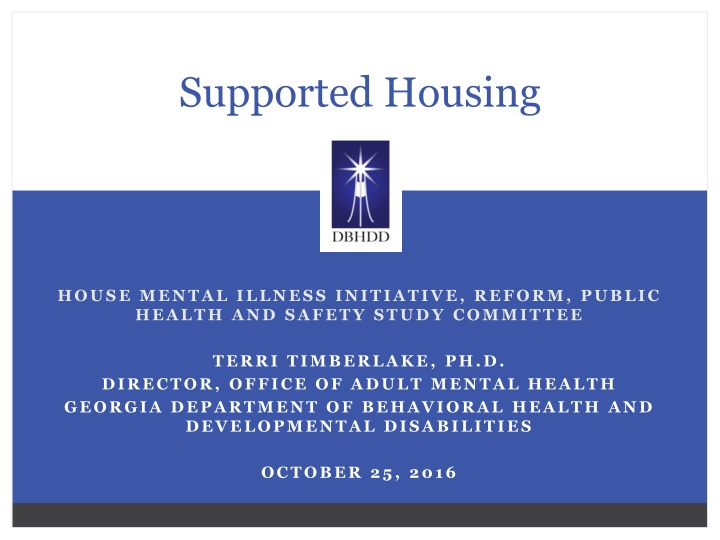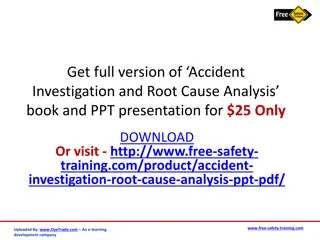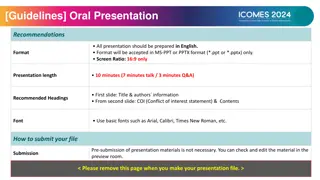
Supported Housing for Mental Health Initiatives and Public Safety Study
Providing supported housing and bridge funding for individuals with serious mental illness to prevent readmissions, homelessness, and facilitate reintegration. The initiative includes Georgia Housing Voucher for affordable housing and Bridge Funding for transition support.
Download Presentation

Please find below an Image/Link to download the presentation.
The content on the website is provided AS IS for your information and personal use only. It may not be sold, licensed, or shared on other websites without obtaining consent from the author. If you encounter any issues during the download, it is possible that the publisher has removed the file from their server.
You are allowed to download the files provided on this website for personal or commercial use, subject to the condition that they are used lawfully. All files are the property of their respective owners.
The content on the website is provided AS IS for your information and personal use only. It may not be sold, licensed, or shared on other websites without obtaining consent from the author.
E N D
Presentation Transcript
Supported Housing HOUSE MENTAL ILLNESS INITIATIVE, REFORM, PUBLIC HEALTH AND SAFETY STUDY COMMITTEE TERRI TIMBERLAKE, PH.D. DIRECTOR, OFFICE OF ADULT MENTAL HEALTH GEORGIA DEPARTMENT OF BEHAVIORAL HEALTH AND DEVELOPMENTAL DISABILITIES OCTOBER 25, 2016
Scope of Work To provide supported housing and bridge funding for target population People with serious and persistent mental illness who are: Currently being served in state hospitals Frequently readmitted to state hospitals Frequently seen in emergency rooms Chronically homeless Being released from jails or prisons Forensic status individuals with SPMI if the court finds that community-based services are appropriate Georgia Department of Behavioral Health and Developmental Disabilities 2
Georgia Housing Voucher (GHV) Assists eligible individuals in attaining and maintaining safe and affordable housing to support their integration into the community. Supported housing includes integrated, permanent housing with tenancy rights, linked with flexible community-based services that are available to consumers of behavioral health services when they need them, but are not mandated as a condition of tenancy. All individuals with financial means will be required to contribute a portion of their income towards their living expenses (tenant paid utilities, rent, and initial start-up expenses). Georgia Department of Behavioral Health and Developmental Disabilities 3
Bridge Funding Funding for security and utility deposits, household necessities, accessibility modifications, and other start-up expenses and or supports needed for a person to transition into supported housing. Bridge funding may also be used to facilitate the transition of an individual from a state psychiatric facility into the community. Georgia Department of Behavioral Health and Developmental Disabilities 4
Supported Housing Housing First approach Voluntary, flexible community-based services Access to community services based on the individual s preference Lease in individual s name Fair Market Rent standard with a utility allowance 30-40% of individual s income towards housing cost Unit must meet housing quality standards (HQS) Housing separate from service compliance Georgia Department of Behavioral Health and Developmental Disabilities 5
GHV Referral Sources (as of Sept. 1) 2011 % 17% 41% 2012 % 47% 2013 % 50% 2014 % 2015 % 2016 % Homeless Residential Hospitals 7% Families Jails/Prisons Other 47% 15% 16% 13% 2% 7% 52% 8% 13% 12% 4% 11% 55% 8% 11% 12% 5% 9% 21% 9% 9% 0% 14% 16% 17% 8% 0% 9% 22% 0% 13% Total Approved: 3,851 Georgia Department of Behavioral Health and Developmental Disabilities 6
GHV: Number of People who have Accessed Supported Housing by State Fiscal Year Goal: 100 served by July 1, 2011 Result: 117 Goal: 500 served by July 1, 2012 Result: 600 Goal: 800 served by July 1, 2013 Result: 963 Goal: 1,400 served by July 1, 2014 Result: 1,607 Goal: 2,000 served by July 1, 2015 Result: 2,423 Goal: 2,358 served by July 1, 2016 Result: 3,213 117% of goal 120% of goal 120% of goal 115% of goal 121% of goal 136% of goal Georgia Department of Behavioral Health and Developmental Disabilities 7
GHV Performance Measures (as of Sept. 1) Housing stability: percent remaining in GHV-funded supported housing after 6 months of placement: 2,502 out of 2,674 DBHDD/HUD standard Above (below) standard 94% 77% +17 points Re-engagement: number successfully engaged out of total number of negative leavers 149/723 DBHDD standard Above (below) standard 22% 10% +12 points Georgia Department of Behavioral Health and Developmental Disabilities 8
Long-Term Housing Stability (as of Sept. 1) SFY 2011 GHV Tenants SFY 2012 GHV Tenants SFY 2013 GHV Tenants SFY 2014 GHV Tenants SFY 2015 GHV Tenants SFY 2016 GHV Tenants SFY 2017 GHV Tenants 77/114 305/467 244/346 460/614 690/882 731/788 65/65 100% 68% 65% 71% 75% 78% 93% Overall Program Stability: 2,572 in stable housing out of 3,276 placed: 79% Georgia Department of Behavioral Health and Developmental Disabilities 9
Meeting the Supported Housing Need for Target Population Housing need and preference assessment Housing First DBHDD-DCA Unified Housing Referral process Section 811 funded housing units DBHDD residential services Georgia Housing Voucher Program Department of Community Affairs Housing Choice voucher Department of Veterans Affairs Supportive Housing vouchers Increasing partnerships with public housing authorities (Columbus and Metro Atlanta) Increasing access to employment opportunities Georgia Department of Behavioral Health and Developmental Disabilities 10
Public Housing Authority Partnership 332 transferred from GHV to Housing Choice Voucher (HCV) Public housing authorities may elect to offer a preference in their HCV programs for people with specific disabilities identified in the Settlement Agreement Georgia Department of Behavioral Health and Developmental Disabilities 11
DOJ Settlement Targets for Supported Housing Original DOJ Settlement targets for bridge funding and GHV were met as of June 30, 2015: DBHDD Service Scattered Site Housing DOJ Target Required 50% of supported housing to be scattered site Required to provide for 540 people Outcome Exceeded requirement: 87% of units were scattered site Exceeded requirement: 1,800 persons supported Exceeded requirement: 2,428 people supported via the GHV Bridge Funding Supports Georgia Housing Voucher Required to provide to 2,000 people Housing Stability: Total number of people maintaining housing for more than 6 months = 2,508, or 94% Georgia Department of Behavioral Health and Developmental Disabilities 12
DOJ Settlement Extension Targets for Supported Housing Settlement Extension targets met as of June 30, 2016: Georgia Department of Behavioral Health and Developmental Disabilities 13
DOJ Settlement Extension targets for Supported Housing Capacity to provide housing for any individuals in the target population who have an assessed need for such support Number of completed Housing Need and Choice Surveys: 3,400 Statewide percent in need of supported housing: 38% Capacity building; DCA collaboration, resource maximization Georgia Department of Behavioral Health and Developmental Disabilities 14
Community Residential Rehabilitation DBHDD Residential Services: temporary supported housing Staff support in residential settings, continuous monitoring and supervision Skills training, community integration activities, and personal support services/activities to restore and develop skills in functional areas that interfere with the individual s ability to safely live in the community, continue with recovery, and increase self-sufficiency Georgia Department of Behavioral Health and Developmental Disabilities 15
Community Residential Rehabilitation 32 providers of residential support services 1,921 statewide supported beds for residential rehabilitation Residential levels of care: 22% intensive: 24-hour/on-site supervised; 5 hours of skills training 29% semi-independent: 36-hour/on-site supervised; 3 hours of skills training 49% independent: minimum of one contact per week; 1 hour of skills training Georgia Department of Behavioral Health and Developmental Disabilities 16
Supported Housing Resources Georgia Department of Behavioral Health and Developmental Disabilities 17
Effect of GHV DBHDD is a leading state agency in providing supported housing for people with significant behavioral health disabilities, via our network of providers and their connection to an array of housing options. DBHDD is the 8th largest provider of rental assistance in the state. Stigma is reduced one property at a time as the most difficult to house become readily accepted as good tenants (986 properties and counting). Stigma is also reduced when property owners are educated about the supports, services and successes. DBHDD is able to create a coordinated referral flow through our partnership with DCA and our other residential programs. Georgia Department of Behavioral Health and Developmental Disabilities 18
Effect of GHV GHVP increases options allowing for better care coordination in hospital transitions, crisis stabilization units, and crisis apartments. Providers able to engage their clients in a stable living environment. Strong coordination between adult mental health community service providers (PATH, ACT, CST, ICM) creating a system of homeless outreach, service coordination, and housing. In-reach efforts into prisons/jails and coordination with mental health courts. Georgia Department of Behavioral Health and Developmental Disabilities 19






















